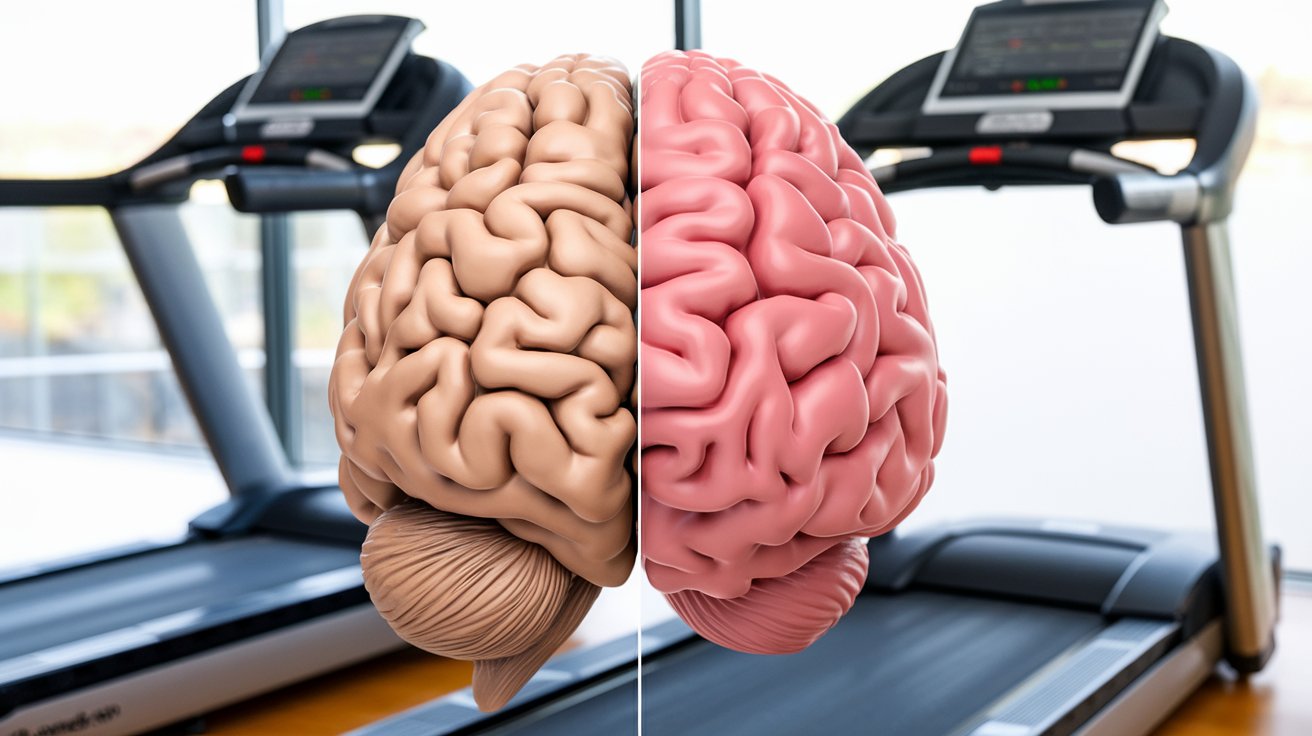The Benefits of Physical Exercise on the Brain and Memory
 Selja
Selja
Physical exercise is often associated with benefits for physical health, such as weight control, reduced risk of chronic diseases, and improved cardiovascular condition. However, the effects of exercise on the brain and memory are equally significant and deserve particular attention. In this article, we will explore in depth how physical exercise positively influences our brain, enhances our cognitive abilities, and strengthens our memory.
1. The Science Behind Exercise and the Brain
1.1 Neuroplasticity
Neuroplasticity is the brain's ability to reshape itself in response to experience and learning. Physical exercise stimulates this process by promoting the growth of new nerve cells, particularly in the hippocampus, a region essential for memory and learning. Studies have shown that activities such as running or swimming can increase the production of brain-derived neurotrophic factor (BDNF), which plays a crucial role in neuronal survival and synaptic plasticity (Zoladz & Pilc, 2010).
1.2 Impact on Neurotransmitters
Physical exercise also influences neurotransmitter levels in the brain. The increase in serotonin, dopamine, and endorphins during and after exercise contributes to improved mood and reduced symptoms of depression and anxiety (Dishman & Buckworth, 1996). These neurotransmitters are essential not only for emotional well-being but also for cognitive processes related to learning and memory.
2. The Effects of Exercise on Cognitive Functions
2.1 Memory Improvement
Research has demonstrated that regular exercise improves not only short-term memory but also long-term memory. A study conducted by Ratey and Loehr (2011) revealed that individuals who engage in regular physical activity show a better ability to memorize new information. Exercise seems to favor mechanisms of encoding and retrieval of memories.
2.2 Concentration and Attention
Physical exercise also has a positive impact on concentration and attention. A study showed that even a short session of exercise can improve cognitive performance in young adults (McMorris et al., 2011). Increased blood flow to the brain during physical activity can help maintain an optimal state of alertness, thereby facilitating concentration on complex tasks.
3. Psychological Benefits of Exercise
3.1 Stress Reduction
Exercise is recognized for its beneficial effects on stress. By reducing cortisol levels, a hormone associated with stress, physical activity contributes to better emotional balance (Salmon & Hall, 2003). Less stress also means better concentration and memory since chronic stress can impair cognitive functions.
3.2 Mood Enhancement
One of the most notable psychological benefits of exercise is its impact on mood. Physical activity stimulates the production of endorphins, often referred to as "happiness hormones," which can reduce symptoms of anxiety and depression (Craft & Perna, 2004). A positive mood is essential for effective learning and optimal information retention.
4. Types of Exercises Beneficial for the Brain
4.1 Aerobic Exercises
Aerobic exercises, such as running, cycling, or swimming, are particularly effective at improving cognitive functions. These activities increase heart rate and promote increased blood circulation to the brain, which can stimulate neurogenesis (the emergence of new nerve cells) (Voss et al., 2013).
4.2 Strength Training
Although less frequently mentioned, strength training also presents significant cognitive benefits. Studies have shown that weight lifting can improve not only muscle strength but also certain cognitive functions, such as verbal memory (Liu-Ambrose et al., 2010).
4.3 Mind-Body Activities
Activities that combine physical exercise with cognitive stimulation, such as yoga or tai chi, have shown positive effects on memory and cognitive abilities in older adults (Gothe & McAuley, 2009). These practices promote not only physical well-being but also mental health.
5. Case Studies: Real-Life Examples
5.1 The "Exercise is Medicine" Program
The "Exercise is Medicine" program was launched by the American College of Sports Medicine (ACSM) to encourage healthcare professionals to prescribe exercise as a complementary treatment alongside medication for various medical conditions. This program has demonstrated that even moderate exercise sessions can have a significant impact on the mental health of patients suffering from anxiety or depression.
5.2 Study on Active Seniors
A study conducted by Liu-Ambrose and colleagues followed a group of seniors engaged in a strength training program for six months. The results showed not only a significant improvement in their muscle strength but also a notable increase in their cognitive abilities compared to a control group that did not participate in the program.
6. Testimonials: Personal Impact of Exercise
Many individuals testify to the positive effects that exercise has had on their daily lives:
.Marie, a 45-year-old teacher:
"Since I started running three times a week, I feel more focused at work and my memory has improved. I can manage my daily tasks better."
. Jean, a retiree:
"I started doing yoga after my retirement. Not only does it help me physically, but it has also improved my mental clarity."
7. Practical Tips for Integrating Exercise into Your Daily Life
7.1 Set Realistic Goals
To fully benefit from the positive effects of exercise on the brain, it is important to set realistic goals. Start by incorporating a few sessions of moderate exercise per week into your daily routine.
7.2 Vary Your Activities
To maintain motivation, vary your physical activities: try different forms of aerobic exercises, strength training, or even team sports.
7.3 Listen to Your Body
It is essential to listen to your body during your workouts. Do not push your limits beyond what is comfortable; moderate but regular exercise is more beneficial than intense sporadic efforts.
7.4 Create a Social Routine
Joining a group or sports community can be very motivating! Whether it's a local team or a group class at your gym, exercising with others can make the experience more enjoyable.
8. Implications for Different Age Groups
8.1 Children and Adolescents
Exercise plays a crucial role in cognitive development among children and adolescents. Studies show that those who regularly participate in physical activities generally achieve better academic results (Singh et al., 2012). Physical activity also stimulates their creativity and problem-solving abilities.
8.2 Active Adults
For young adults through middle-aged individuals, regularly incorporating sports helps maintain good physical health while managing stress related to work or family responsibilities.
8.3 Older Adults
In older adults, even light activities like walking regularly can have a significant impact on their cognition and overall quality of life (Bherer et al., 2013). Tailored programs can help prevent cognitive decline associated with aging.
Conclusion
The benefits of physical exercise on the brain and memory are undeniable. By enhancing neuroplasticity, stimulating the production of beneficial neurotransmitters, and reducing stress, physical activity plays a crucial role in our overall cognitive health throughout our lives.
Whether through aerobic exercises or activities combining movement with reflection, regularly integrating sports into our daily lives can have a lasting impact on our memory and cognitive abilities.
References
- Bherer L., Erickson K.I., & Liu-Ambrose T. (2013). A Review of the Effects of Physical Activity and Exercise on Cognitive and Brain Functions in Older Adults: A Review of the Effects of Physical Activity and Exercise on Cognitive and Brain Functions in Older Adults*. *Journal of Aging Research*, Article ID657508.
- Craft L.L., & Perna F.M.(2004). The Benefits of Exercise for the Clinically Depressed*. *Primary Care Companion to The Journal of Clinical Psychiatry*,6(3),104-111.
- Dishman R.K., & Buckworth J.(1996). Increasing Physical Activity: A Quantitative Review of Interventions in Cancer and Chronic Illness Survivors*. *Health Psychology*,15(5),342-354.
- Gothe N.P., & McAuley E.(2009). Yoga and Cognition: A Meta-Analysis of the Effects of Yoga Practice on Cognition*. *Psychological Bulletin*,135(6),1067-1088.
- Liu-Ambrose T., Nagamatsu L.S., Voss M.W., & Kramer A.F.(2010). Resistance Training and Executive Function in Older Adults: A Randomized Controlled Trial*. *Archives of Internal Medicine*,170(2),170-178.
- McMorris T., Tomporowski P.D., & Howard A.C.(2011). Effects of Exercise on Cognitive Function in Older Adults: A Review of the Literature and Future Directions for Research and Practice*. *Journal of Aging Research*, Article ID302823.
A simple and natural wellness secret awaits you. Click here to learn more and change your routine.
https://medicinalseedkit.com/kit/#aff=selja48
Subscribe to my newsletter
Read articles from Selja directly inside your inbox. Subscribe to the newsletter, and don't miss out.
Written by

Selja
Selja
Committed to helping you achieve optimal health through pratical and natural solutions.